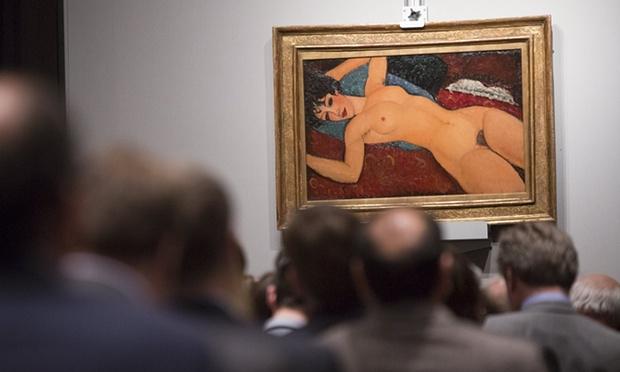Topping the price of any Modigliani sold in the past, the artist’s iconic “Nu Couché” was sold to Chinese billionaire Liu Yiqian at Christie’s evening sale held in Manhattan earlier this week. The Modigliani portrait was undeniably the auction’s star piece, but the painting stunned when Liu placed his bid via telephone at the astounding price of $170 million, $70 million more than the set price announced by Christie’s in early September. The theme of Nov. 9’s evening sale was “The Artist’s Muse,” featuring works by Picasso, de Kooning and Lichtenstein to name a few of the prominent featured artists. The beginning of the night was wonderfully successful, with Liu’s offer surpassing the former record-holding price of a Modigliani by $100 million. A Lichtenstein portrait sold for $95 million, also setting the auction record for the American pop artist. The rest of the evening, however, failed to sustain the trend. Several works that were estimated over $10 million were left unsold, including a de Kooning and a Picasso portrait. The outcome of the sale was just another testament to the unpredictability of the art market, but luckily for Christie’s Modigliani, resulted in a huge win.
The news of the sale instantly made international headlines and Liu gained a precious addition to his art collection, yet not everyone was left satisfied with the results of the night. Filippo Nogarin, the mayor of Livorno, Italy, characterized Liu’s acquisition of the Modigliani as a loss for not only the city of Livorno, but for the country itself. He expressed his disapproval of the painting being sold to a private person instead of a large museum where such masterpieces could be widely appreciated. Given that Modigliani himself was born in the port city of Livorno, the mayor claims that the people had a “visceral love” for the artist, as well as a tinge of “guilt” because he left so young. Nogarin believes that the work should have stayed in Livorno, where the painting could have become a popular local attraction and a treasured experience of viewing the art in its artist’s birthplace. In his comments, the mayor also alluded to Italian Prime Minister Matteo Renzi’s recent purchase of an Airbus 340, scornfully stating that he would’ve “preferred one more Modigliani and one less aeroplane.”
Though Nogarin disapproves of removing “Nu Couché” from Italy, Liu Yiqian is ecstatic to bring the work to China. The former cab driver turned businessman isn’t someone new to the art world: last year, he stirred headlines when he not only purchased the infamous “Chicken Cup” for $36 million using an American Express card, but when he casually sipped tea from it as a celebratory gesture. The porcelain cup is a 500-year-old Ming dynasty treasure, and one of ony 19 that still exist. Since then, Liu has been slowly acquiring mostly ancient Chinese works for his private collection and newly established museums in Shanghai. He hopes that “Nu Couché” will push the museum into “a new era” where Chinese art enthusiasts may appreciate a Western masterpiece “without having to leave the country.”
Liu and Nogarin’s points both have their merits, but the mayor seems to have a stronger argument. The art market is increasingly business-driven, and auction houses give away these precious works of art literally to the highest bidder. For cities or countries such as Italy, whose leaders are more inclined to invest in an airplane rather than the pièce de résistance of Modigliani’s paintings, this results in a loss. Unfortunately, there doesn’t seem to be a clear way to resolve this issue of which works should qualify as integral to a culture’s heritage and what can be allowed as a private good. Prior to “Nu Couché’s” sale, the portrait had been hidden from the world in a private collection for 30 years. Given this context, Nogarin seems right in expressing his disdain that such a universally appreciated work as “Nu Couché” travels from private collection to private collection without the chance of being fully exposed to the audience it deserves. It’s not obvious how we might solve this issue for the Picassos, Van Goghs, or Modiglianis in the world, but for now, we only hope that the $170 million Modigliani will find proper appreciation in its new, unfamiliar home.




